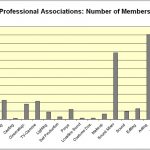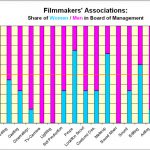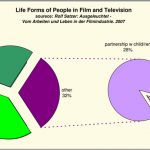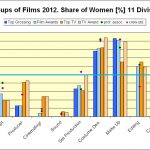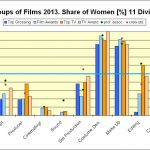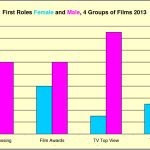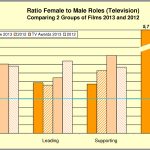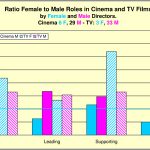Lately I have heard quite a few people saying that it is the female comissioning editors’ fault so few women directors are working in German television. I have not found any reliable data to support this, but if the appallingly low figures for women directors are anything to go by, then it must be at least also the men’s fault. But that is a topic for another day.
Today’s text is about a public radio show, run by an all female editorial staff, and 2 1/2 years of its weekly programme – which appear to represent a certain type of woman blindness.
This article is a bit on the extensive side – at the end you will find all figures in a gallery.
Ask yourself: What would DRadio Kultur do? And then…
In the film HOLIDAY (1938, directed by George Cukor) Cary Grant’s character Johnny Case at one point says to Katharine Hepburn’s Linda:
When I find myself in a position like this, I ask myself what would General Motors do? And then I do the opposite!
This won’t have been the first time that the expression “ask what would X do, so I will do the opposite” was used in a film, actually, the film HOLIDAY (based on the play HOLIDAY by Philip Barry from 1928) is a remake itself. Already in 1930 Edward H. Griffith had made a film of this story, and incidentally the actor Edward Everett Horton – who played a number of distinct supporting roles to Cary Grant and Katharine Hepburn as well as to Ginger Rogers and Fred Astaire – was cast as Johnny Case’s best friend Nick Potter in both the 1930 and the 1938 film version. The character Linda (played by Katharine Hepburn) is based partially on Gertrude Sanford Legendre (b 1902, d. 2000), a US-American socialite who was active as a spy in WWII, she was also a big-game hunter, environmentalist, owner of a plantation and she took part in expeditions.
Actually I only wanted to find out who wrote the script for HOLIDAY to give a proper source to the quote, it were Donald Ogden Stewart and Sidney Buchman, who a few years later were added to the infamous Hollywood blacklist of the in the 1940s / 1950s by the House Un-American Activities Committee.
But now back to today’s topic, the radio show “FEUILLETON – CONVERSATIONS WITH LISTENERS” of Deutschlandradio Kultur that is broadcast every saturday between 9 and 11 a.m. The show has a host and one or two guests, who discuss a more or less current topic, and listeners can participate by calling in, sending emails or using social media platforms.
The Guests: Looking back on 2 1/2 years of CONVERSATIONS
What we see (or rather: hear) is quite alarming. 2013, 2014 and in the first half of 2015 more than half the show had no female guests. On the other hand, only 10 % were without men. About a third had only one guest. In general, the first half of 2015 shows an improvement over 2014. But still the balance is quite negative, for now, considering all shows up to Aug 8, 2015 has 22,0 % male and 78,0 % female guests, 65,4 % of the shows were without women and 7,7 % without men.
The Hosts
In 2013 and 2014 there was roughly the same number of female and male hosts. In the first six months of 2015 this changed drastically, only every fourth (!) show had a female host behind the microphone. Klaus Pokatzky, who joined the programme in July 2014, has already hosted half the shows in 2015. Pokatzky is roughly in his early 60s, he is known for interrupting calling listeners quite abruptly regularly (should the other hosts also interrupt, they at least do it more low-key) and he speaks more about himself than his colleagues do, so a change in tone.

The Topics
How rarely the editors of the show have women on their agenda we can not only deduce from the guest lists but also from the choice of topics. Two Examples:
March 8 is International Women’s Day. On March 6, 2015 the German parliament (Bundestag) passed the law for a 30 % gender quota for the boards of the top 100 companies. Was this the topic in CONVERSATIONS on March 7? No. Instead, they discussed VACCINATIONS, YES OR NO with two male guests.
A Quota for Women has not been topic in 2013, 2014 or 2015 in any context.
March 20 2015 was Equal Pay Day, in Germany women still earn considerably less than men. Was this topic in the show on March 21? No. Instead: WHAT IS INTELLIGENCE? One male guest.
Unequal Pay and the Gender Pay Gap have not been topic in 2013, 2014 or 2015.
The ,classical’ women’s topic Family was 3 times on the show: on Feb 16, 2013 (“What must be changed about family policy’, 2 F), on Nov 2, 2013 (“Living separetely – and bringing up the children together” 1 F 1 M) and on Feb 2, 2014 (“Children and career and love and… the difficult balancing act between family and job” 1 F 1 M). Or maybe 4 times, when we count “Reproductive medicine” as a family topic as well (March 29, 2014). Actually, for this topic I find it double strange that there were no female guests on the show.
The next diagram shows all topics from 2013, 2014 and 2015 (up to Aug 8) that had only male guests in the studio:

The Ages of the Guests
For 2014 and the first six months of 2015 I have analized the ages of the guests. My statistics are incomplete (first column kA = keine Angabe, no data), because I could not find out all birth dates. For comparison I take the age a person was on January 1 of the year, and the ages are grouped in 5 years (e.g. 40 = 36 – 40 yrs).
Two things are remarkable: very few guests younger than 36 years were on the show, as opposed to a great number of guests from retiment age groups. Why is the overall guest list for the 1,5 years not more diverse? Young and old people can bring different and interesting opinions and experiences into the programme, just as women and men can.
One expert on the show, whom I called to find out his age (36) had the theory that the imbalance in favour of older guests might be connected to the target group of the programme. That is possible. Although I ask myself if e.g. older listeners really don’t like listening to younger experts as well? And the Chicken-or-Egg question must also be asked: Is the show design to fit the target group or does the show form its target group through its topics and guests? But that is a question for another day.
Professors
Yes, Professors play a big part on the show. The next two diagrams show, how many active and retired professors had been invited as experts. There were more male professors on the show than female guests.
The Makers of the Show
Women not being visible as experts – and as potential role models – is not only a problem occuring in CONVERSATIONS, we also have it in TV talk-shows, on the panel of conferences and in documentaries for example. Men explain the world, men are the experts, men live the life.
More and more people are irritated by this. As an example: journalist Torsten Körner said in his review of the documentary DIE INSEL / THE ISLAND about West Berlin during the times of the Wall (Deutschlandradio Kultur, 21. Oct.14):
Looking back something is missing in this film. There were round about 16, 17, 18 interview partners of which only 3 were women. In retrospect I would have appreciated the female perspective, and also some East Berlin people looking at the City of West Berlin. In the film it is only West Berlin people and a few US Americans…
A year ago I spoke with editorial head of CONVERSATIONS Susanne Schröder on the phone (It’s a Men’s Radio World? 14. Aug. 14); she convinced me that she really would like to have more women on the show.
But if anything, the situation has deteriorated since then. And this despite “too few women in talk-shows, on panels, at conferences” are broadly being discussed, despite the founding of the database Speakerinnen (she-speakers) Speakerinnen.org, and also despite us living in the digital age where it is much easier to find female experts via the internet. In the blog text mentioned just now I published the results of a first, not too extensive search, where I found female experts for the radio shows and topics, that had only men in the studio. Women who are ready to appear on the radio show on a saturday morning. Why are the editors of the programme unable to succeed in a similar way?
- Could it be that they have the wrong networks?
- Could it be that their data base is too one-sided?
- Could it be that they lack curiosity and creativity in their search for guests?
- Could it be that they are not aware of the total extent of this miserable situation, because they don’t monitor their guests (gender, age) and topics?
I sent my text including suggestions for female experts to the makers of the show and waited for their comment. This is the answer I received from the Hörerservice / Listeners’ Service:
On behalf of the listeners’ service I have been in contact with the editors of the programme and was told that person in charge had already spoken with you on the phone in great detail about the points you raised. Please understand that we won’t comment on the subject again. Let me just say this: apparently you have only been counting the guests of the Saturday show CONVERSATIONS. When reforming the Dkultur programme in June we also introduced a ,Conversation on weekdays. If you consider those shows as well you will certainly be satisfied to find out, that the ratio between female and male guests is quite even. And also: the editors of CONVERSATIONS are only women! This just as an information for you.
Indeed, my evaluations don’t include week-day shows, but for a good reason. They have a similar title but basically they are completely different. They are 60 min. long (instead of 2 hours on the Saturdays), they always have only one guest who is being interviewed on biographical questions or their latest book, – as opposed to the discussion of topics with the inclusion of listeners on Saturdays.
It is a pity that the editors have not commented on my article. I had actually hoped they would be happy about the many interesting female experts I had found for topics on the show. Oh well, “happy” is probably too strong a word.
Outlook
CONVERSATIONS is financed by public fees. Public radio has the obligation to provide information and to entertain, and to contribute to public opinion formation. And for that goal one-sidedness and blindness for women are counterproductive. The following quote by the chairman of Deutschlandradio, Dr. Willi Steul, is from 2013:
One cannot reasonably argue that men look upon the world with a gender specific perception. Therefore we men should always be aware of that. Also women have their gender specific experiences and perception. That means that only when regarding both perspectives in a roughly balanced manner are we able to picture reality in a roughly adequate way. (source)
I will send today’s article to the programmes chief editor Susanne Schröder. And also to Deutschlandradio chairman Dr. Willi Steul, to the radio’s women’s representative Ulrike Stengel and to the head of the broadcasting council Frank Schildt.
Should I get any answers I will publish them here.
Further Reading
In the German version I recommended 3 interesting articles that are unfortunately only in German. So I can give you just one sarcastic recommendation, the Gender Equity Tip Sheet which Bryan Gaensler posted on twitter.














